Should you use points or cash to book hotels?
Update: Some offers mentioned below are no longer available. View the current offers here.
Here at TPG, we often talk about maximizing points and miles for outsized redemption. But what does that mean, exactly? And how does this rule-of-thumb help you decide when to use points or cash toward a hotel stay?
If you're just getting started in the world of points and miles and learning to maximize your travel, here's what you need to know.
[table-of-contents /]
Cash pricing is dynamic; award rates are often more static

Not all points are created equal. Marriott Bonvoy, Hilton Honors and World of Hyatt points are as different from each other as dollars, pounds and francs — and every other loyalty program out there should be thought of as a different type of "currency."
Hotel cash rates rarely align perfectly with their award night pricing. Cash prices are dynamic, constantly fluctuating based on demand. Meanwhile, each hotel chain handles awards differently. Hilton's award chart is primarily dynamic; Marriott follows an peak/off-peak price structure, and Hyatt is beginning to follow suit.
Related: These are the best hotel loyalty programs
So how do you know what your points are worth? TPG's done the math for you: Our valuation guide is updated monthly, and serves as a valuable resource to help convert your award currency.
Sometimes when cash prices are very high or very low, it's easy to see that paying in points is a no-brainer.

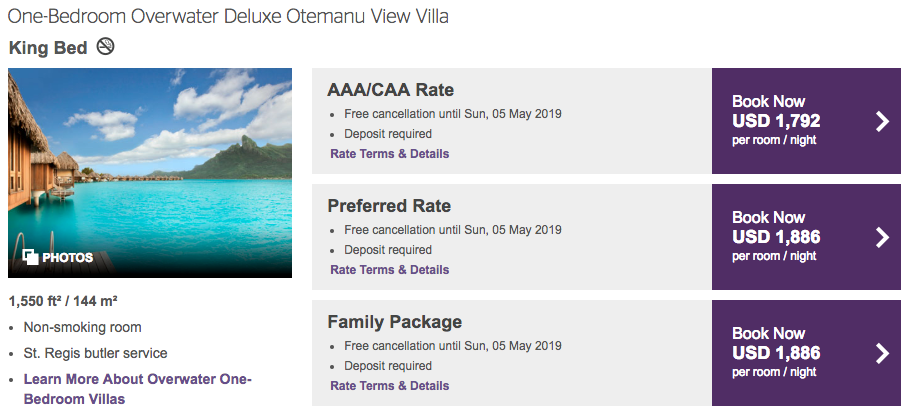
A few years ago, TPG founder Brian Kelly was able to book an overwater villa at the St. Regis Bora Bora for the equivalent of 48,000 Marriott Bonvoy points per night. If he had paid cash, the deluxe room would have cost him at least $1,792 per night before taxes and fees!
But other times, the decision is much harder to make, and can involve a lot of math.
Let's look at an example. 10 nights in an overwater villa at the St. Regis Bora Bora would cost you a whopping $2,136 per night in cash over the 2021 holiday season.
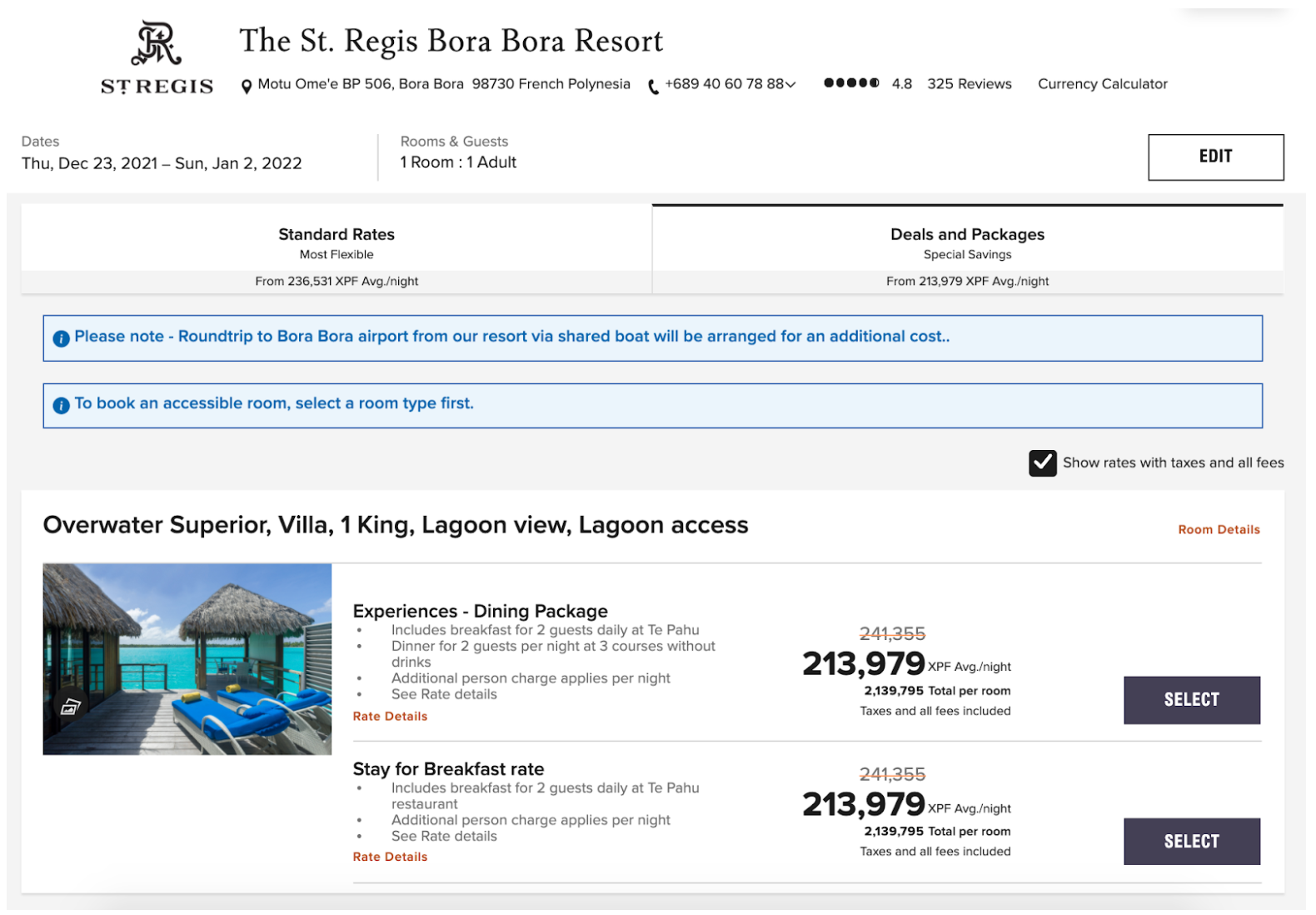
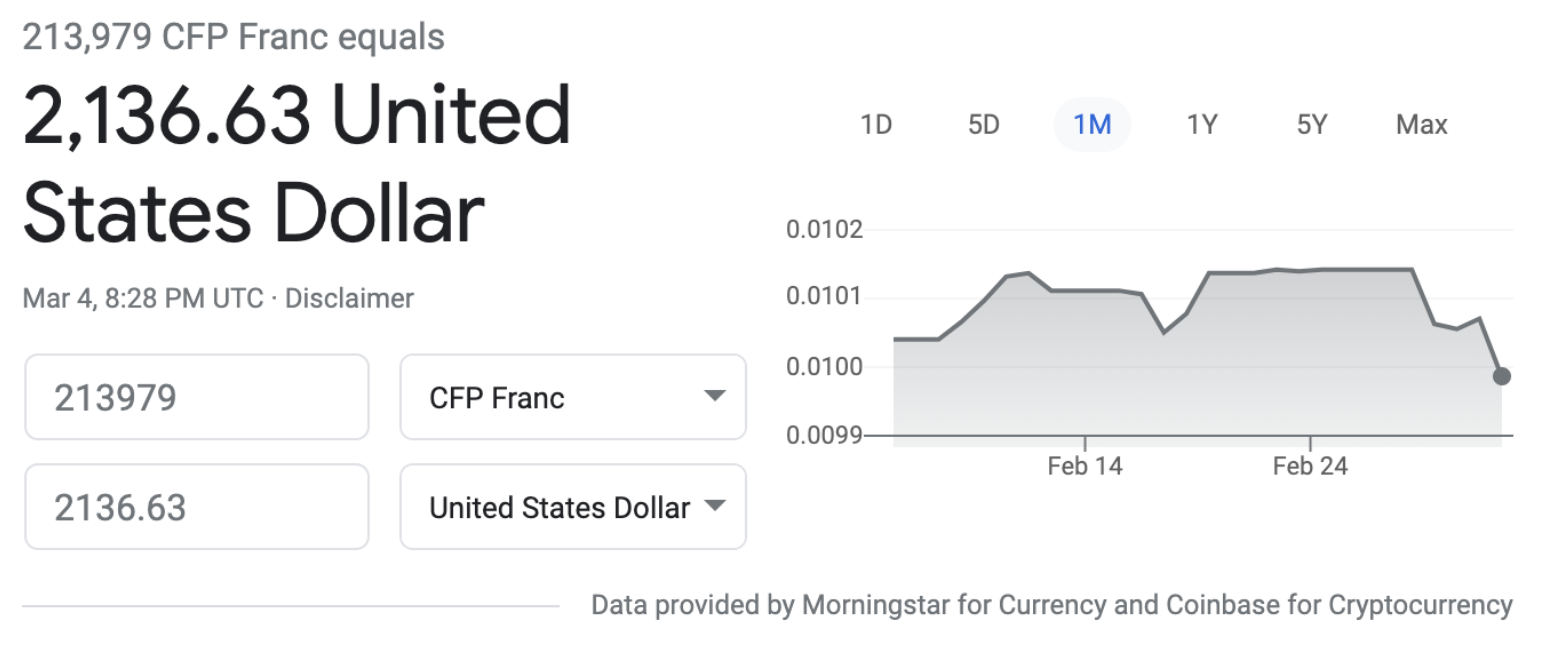
But if you decide instead to pay for your 10-night stay with Marriott points, the stay will cost you 800,000 Bonvoy points and $9,486 at current rates.
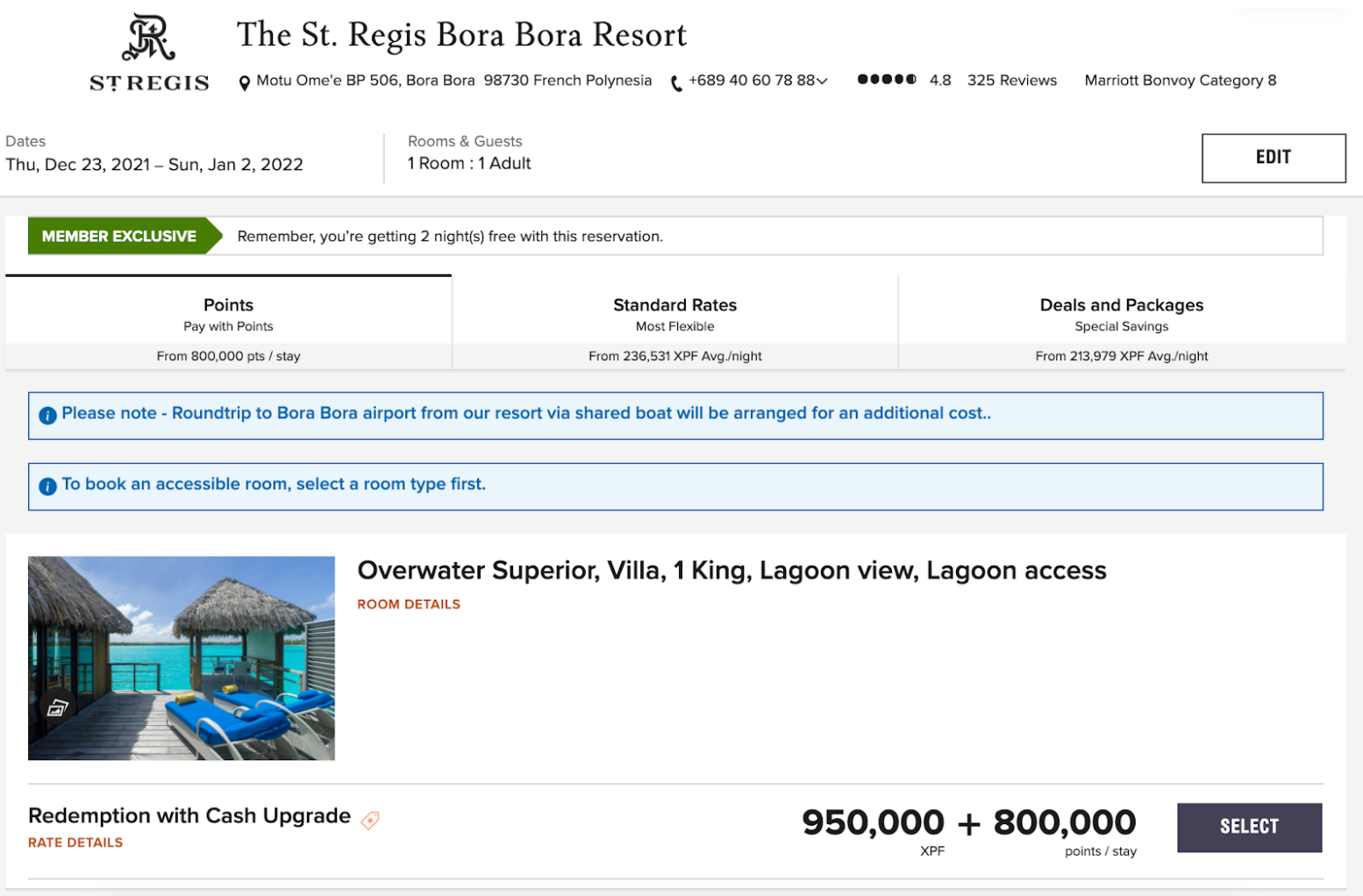
Marriott offers one free night per five nights stayed on award bookings, which means two of the 10 nights are not charged in the award pricing above. By TPG valuations, the 800,000 Bonvoy points are worth $6,400 by current conversions.
So a points-savvy traveler would get an aspirational overwater stay valued at $21,360 for just $9,486 cash out of pocket, and the equivalent of $6,400 in Bonvoy points, for a total monetary equivalent of $15,886.
While these numbers may still seem astronomical for a vacation stay, the points booking would save $5,474 over the cash rate.
If you're trying to figure out your own next trip, here are the factors to consider when deciding whether to pull out your credit card or your points balance for your next stay.
Know what you're looking for
Choosing the right hotel can be overwhelming, especially compared to booking flights. Unlike the dozen or so routes you can fly, many destinations offer hundreds of options to choose from.
To avoid picking blindly, I like using Hotels.com to quickly evaluate my options based on geography. While Google offers decent hotel search options, I personally prefer using the Hotels.com map tool to quickly identify all of the available hotels in a neighborhood. I like to utilize the filters to the left of the map to reflect my criteria as best as I can. (Use the pop-out key to the right of the map to hide hotels that don't fit your needs.)
Related: My experience booking a safe staycation during the pandemic
My list usually includes:
- Location
- Quality
- Price
- Elite status earning opportunity
- Traveler reviews
When my top priority is cost, I use the nightly price filter to look for the most affordable hotel that meets my criteria. Some of the time, that means booking with an independent property that isn't part of a major chain, which requires paying cash. Even then, the room doesn't have to cost me anything out of pocket.
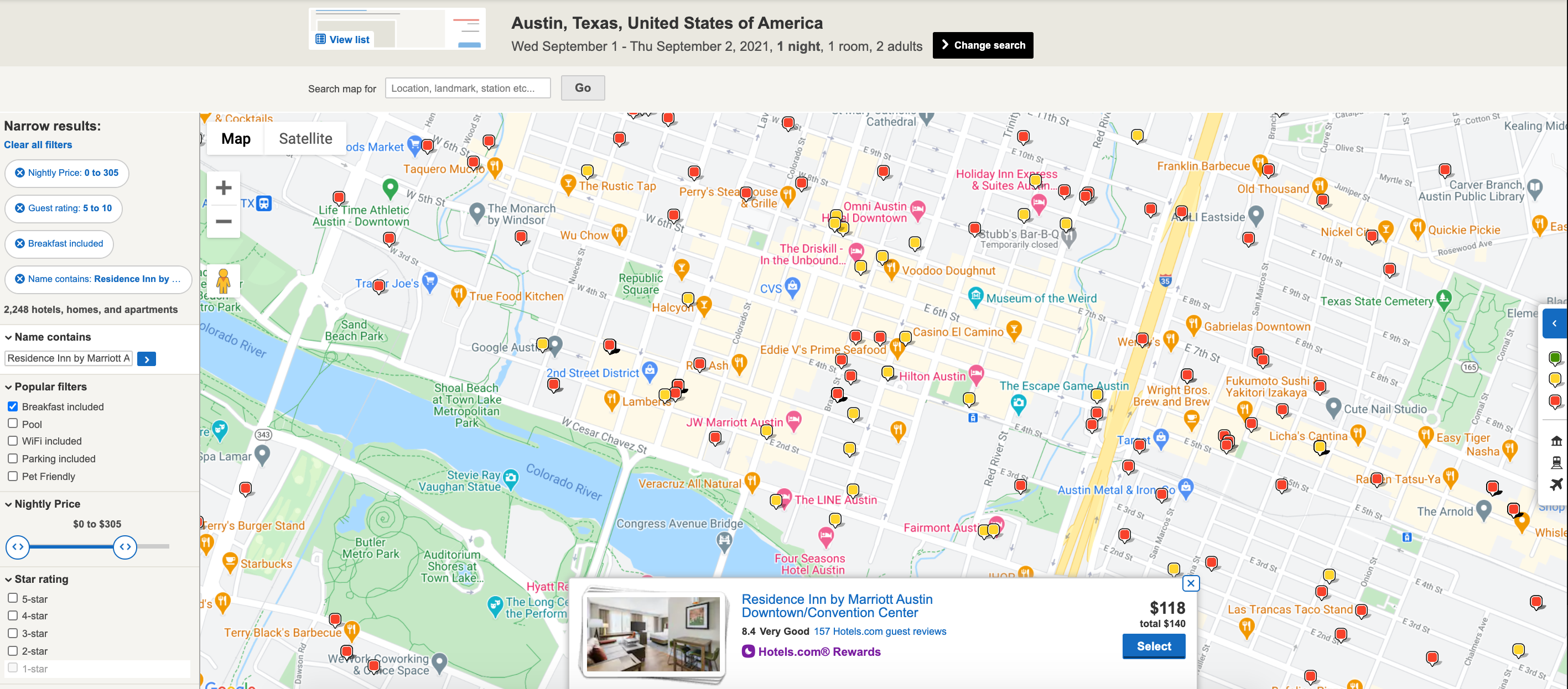
According to this legend, the "street price" on the Residence Inn by Marriott Austin Downtown/Convention Center is $140 per night after taxes and fees.
Now that I know the going rate for the room, my next step is to compare the cost with booking from Marriott, and to see whether I'd get a better deal paying with points or cash.
Cash vs. points: What is the room value per night?
The first step in an effective price comparison is comparing the nightly rate in cash against the award value of the room. This is especially important when your travel dates are fixed, when you can't make your booking decision based on the lowest price across flexible dates. (There's a little bit more wiggle room if you're planning a trip around value instead of specific dates, such as for an aspirational honeymoon with flexible timing.)
Related: This, not that: Why book hotels vs. Airbnbs during the pandemic
Here's a good example from the above search. The Residence Inn in downtown Austin typically costs just over $100 per night. Since it's a Marriott Category 5 property, you'll spend 35,000 Bonvoy points per night to book that same room. Since TPG currently values Bonvoy points at 0.8 cents apiece, that award night will cost you $280 in points.

Your cash rate is $112, while your award night value is $280, so you'll get better bang for your buck by paying in cash. Additionally, you'll be earning points with the hotel chain and making progress toward elite status with each night you book in cash. Of course, don't forget to use a co-branded credit card or a travel-focused credit card to earn extra rewards on your purchase.

But what happens to that room rate over high demand dates, such as during SXSW or Austin City Limits? If you're paying cash, you'll end up splurging a whopping $1,469 a night for a Residence Inn.
Meanwhile, the same award price still applies: 35,000 Bonvoy points per night.
Related: Hotel elite status match and challenge options
In this situation, you're comparing $1,469 per night before taxes and fees against that same $280 value in award points. This is what "outsized value" looks like: Getting a $1,500 hotel room for nothing out of pocket, assuming you don't need to purchase those points.
Of course, there will be exceptions: During high demand times, many hotels will block off or limit the number of available award rooms in order to earn additional cash revenue. Or you may not be able to get the room type you want, since many award nights can only be booked in the hotel's lowest-tier room.
Resort fees
Resort fees are a curse in the eyes of many travelers. In the words of TPG engagement director Richard Kerr, "A resort fee is a second room rate charged purely to increase a hotel's profit." Resort fees have been known to reach $100 per night before taxes and fees — and that's in addition to the base room rate.
Kerr calls these fees "second room rates" because they're mandatory, taxed identically to the advertised room rate and don't cover amenities such as pool towels, fitness center access, free local phone calls or for making faxes.
Booking hotel stays on points is one way savvy travelers avoid resort fees. Some hotel chains, such as Hilton and Hyatt, waive resort fees on all award bookings, which can easily add up to a few hundred dollars in savings on longer stays.
Related: How to avoid resort fees
The Category 6 Hyatt Regency Aruba charges a resort fee of $70 per night on top of taxes, bringing a base rate of $464 to $587 very quickly.
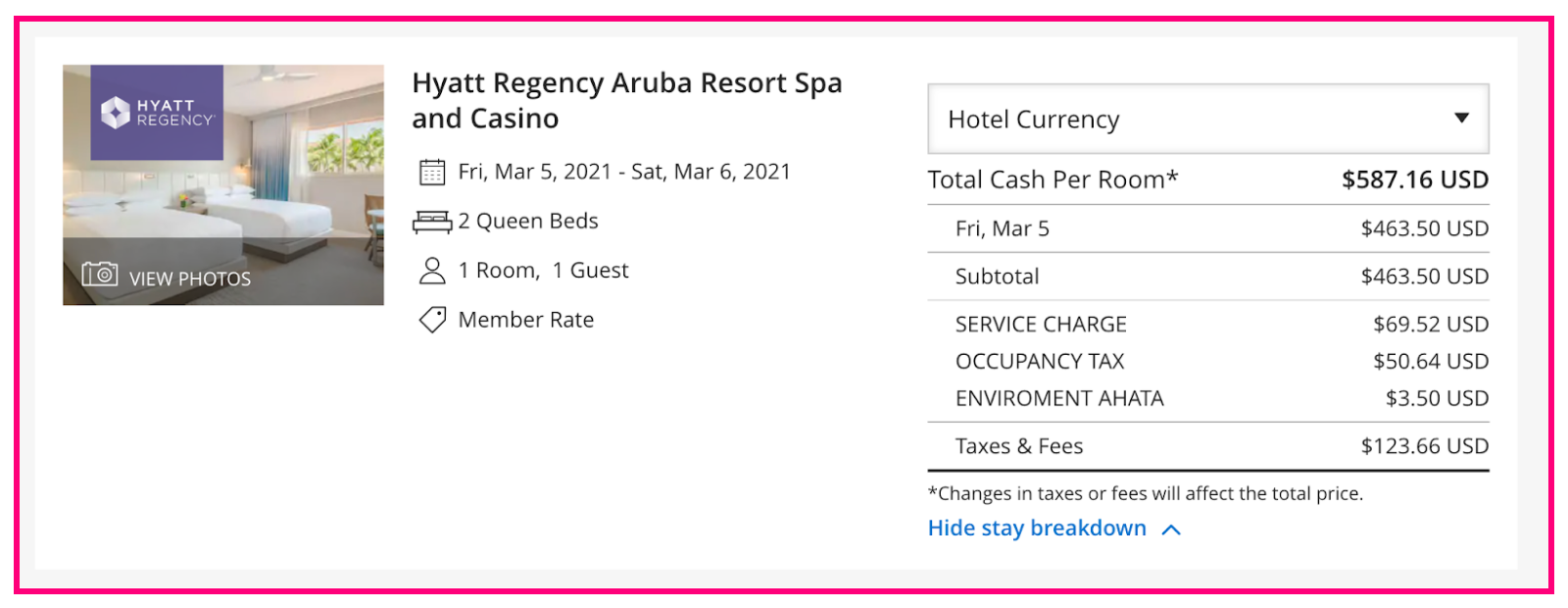
However, the same room costs just 25,000 World of Hyatt points for the exact same night, with no additional cash costs whatsoever. By TPG valuations, those 25,000 points are worth $425 at 1.7 cents apiece. So while the base value of the room is approximately the same whether paid in cash or points, the waived resort fees really tip the scales in favor of an award booking for this particular resort.

Unfortunately, Marriott is a negative exception in this realm: The hotel giant does not waive resort fees, even on award redemptions.
Related: How to make the most of your Marriott resort fees
So if you booked the ultra-swanky Category 8 Marriott W South Beach on Bonvoy points, you'd pay 70,000 points per night plus $45.60 cash in resort fees. Those points, valued at 0.8 cents apiece, are worth $560.
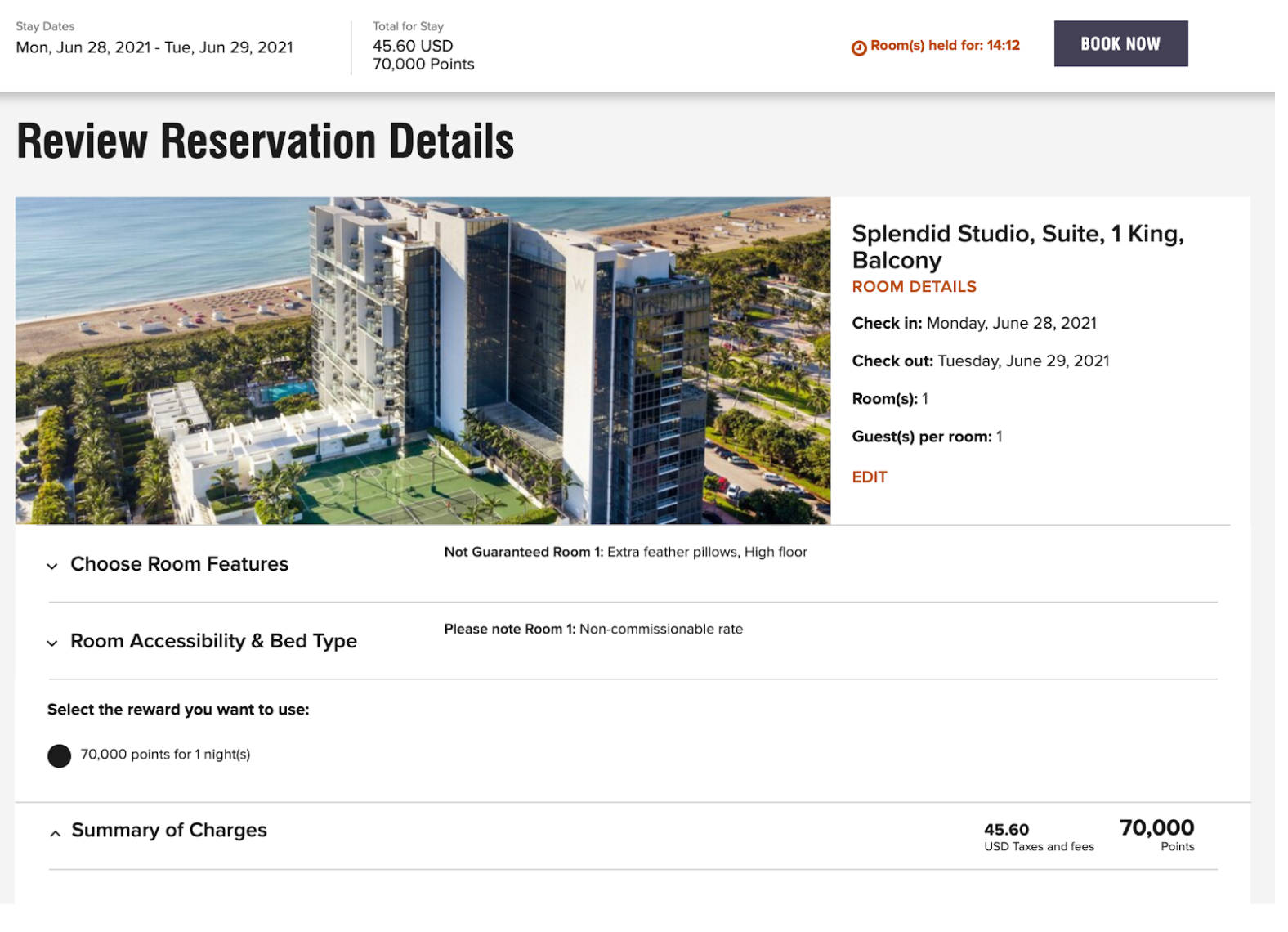
The cash rate on the room is $601 per night over the same dates, which means your award redemption is nearly equal in value to a cash stay after factoring the $45.60 resort fee cost on the award booking.
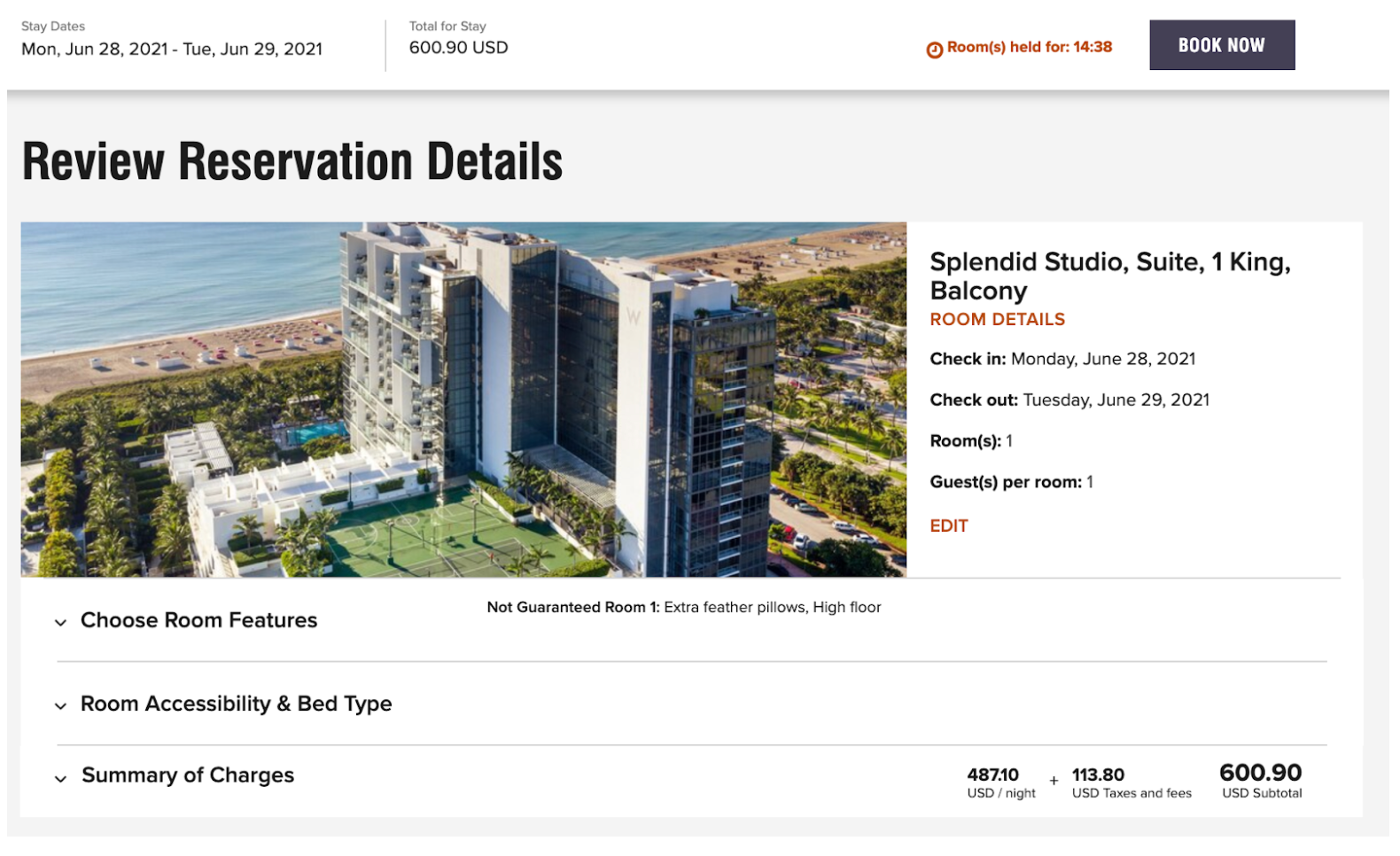
Factor in bonuses, freebies and waived taxes

Knowing your point perks is a crucial part of utilizing your rewards to the max. Marriott and Hilton, for instance, give you your fifth night free on all award bookings — and they do stack. (So yes, if you book the St. Regis Bora Bora for 10 nights on points, you'll only pay for eight nights.)
Furthermore, most award redemptions do not trigger taxes since no payment is exchanged, so you'll save even more cash that way.
However, some bookings still have costly cash fees that can't be paid with points. For example, seaplane transfers to and from the St. Regis Maldives Vommuli Resort cost $745 per person round trip, and are not included in your room rate.
So when pricing out your next trip, be sure to factor these types of fees into the total cost.
Check your budget and points balances

Once you know the hotel cost in both cash and points, it's time to evaluate your wallet. Do you have the money on hand to splurge on cash right now? If your cash budget is tight, points may make sense. Paying with points is the right call if you don't have the available cash to pay for the ticket — and that is OK. You don't always have to get outsized value on your points to score a good deal.
Related: 7 amazing hotels around the world that you can book with points
If your points balance is low, don't despair yet. If you have a travel-branded credit card from issuers like Chase, American Express or Citi, chances are high that you might be able to transfer some of your Ultimate Rewards, Membership Rewards or ThankYou points toward your hotel loyalty account.
Many programs offer a 1:1 transfer ratio — for instance, Chase Ultimate Rewards transfer to Marriott and Hyatt instantaneously, and one UR point can become one Bonvoy or World of Hyatt point. (Of course, Bonvoy and World of Hyatt points aren't actually equal: TPG values Bonvoy points at just 0.8 cents apiece, while World of Hyatt points are far more valuable, worth a respectable 1.7 cents apiece.)
Individual point value aside, the easy transfer ratio simplifies your calculations, and allows you to complete your booking with just a slight delay to account for transfer time.
One major caveat: TPG considers many issuer points significantly more valuable than the average hotel point for their versatility You can transfer issuer points to a number of different airlines and hotels as needed to boost your various loyalty program account balances, especially for redemptions of outsized value.
So even if the 1:1 transfer ratio is appealing to you, do the math to make sure an award booking still makes sense for you.
Think ahead: Are you saving for something big?

Regardless of value, it might make sense to pay cash in a few situations. For example, cash makes sense if you are low on points, or are saving up for a big future redemption — or if you're trying to hit a minimum spend requirement to earn a sign-up bonus.
The other thing to consider is if you need to earn a certain amount of nights towards status. Remember that award nights sometimes don't count towards status at some hotels. Fortunately, most of the major chains are now counting award nights towards status.
As always, use your co-branded hotel credit card or a card that earns bonus points on travel in order der to stash away extra points toward your next stay. (And don't forget to give the hotel your membership number for bonus perks on this trip, and credit for nights stayed.)
Value of points earned
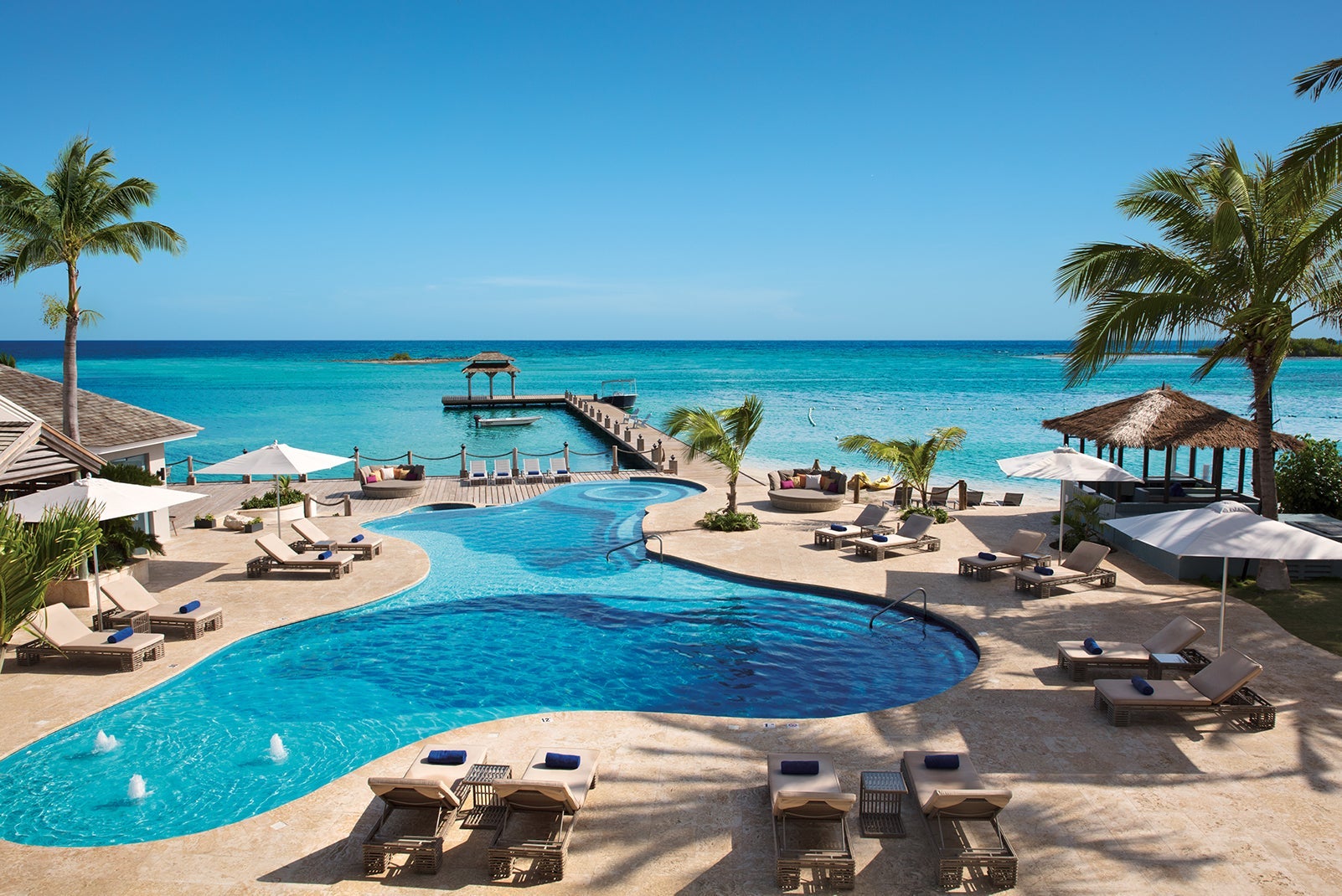
In close comparisons, remember to factor in the potential points you could earn by paying for your stay in cash.
Let's go back to the W South Beach example from earlier. The price per night was $601 in cash, or the equivalent of $560 in Bonvoy points plus $45.60 for the mandatory resort fee. Although the two values are all but identical, the earning potential is drastically different.
At the highest end of the earning potential, a traveler who holds Marriott's top-tier Bonvoy Brilliant card from American Express would earn 6 points per dollar on base room rates, or 2,922 Bonvoy points in this scenario. Furthermore, booking through a shopping portal could net additional cash back (3.2% as of this time). In addition, the night would count toward elite status requirements for the year, bringing the traveler one step closer to the next tier of benefits. Finally, the Bonvoy Brilliant comes with a $300 annual statement credit that can be used on hotel bookings. All told, this $601 room at the W South Beach could end up costing a savvy traveler just $282 out of pocket ($601 minus $300 statement credit, minus $19 in cash back), and earn nearly $24 in Bonvoy point value toward a future stay.
Here's another example to consider. The base rate for a one-night stay at the Hyatt Regency Aruba Resort hover around $450 per night. But the cash rate shoots up to $587, while the points rate is valued around $425 per night.
Related: What are my points and miles worth?
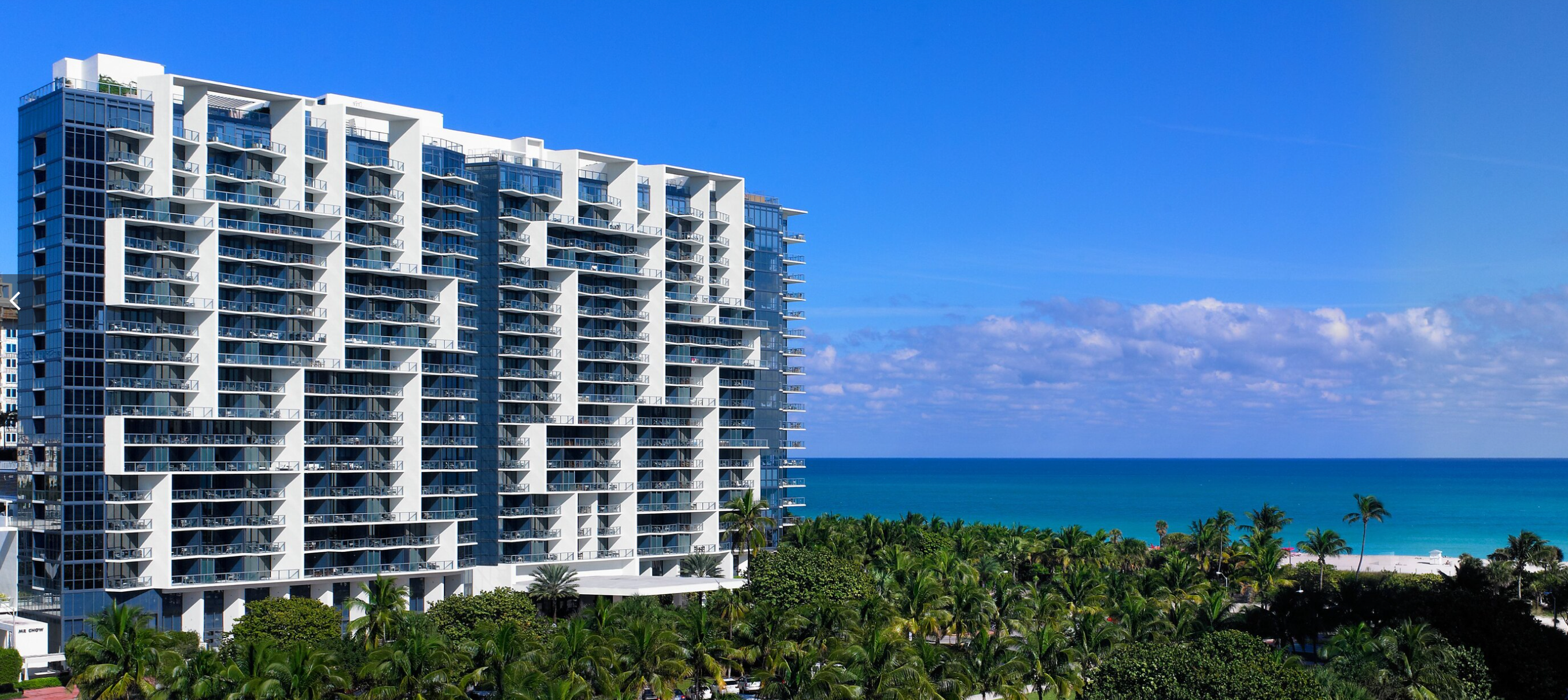
In this scenario, it might look like booking with points would make the most sense. But a traveler trying to hit a spending requirement to earn a sign-up bonus, for example, might see this as a great opportunity to earn some extra points.
Let's say I'm trying to reach a spending requirement on my brand new World of Hyatt credit card. I'll need to spend $3,000 within my first three months of card ownership to earn 30,000 World of Hyatt points. Fortunately for my hypothetical plans, I'm planning on booking a one-night stay at the Hyatt Regency Aruba in the next few days.
The $587 charge on my credit card earns 4 points per dollar spent toward Hyatt purchases, for a total of 2,348 points worth $40 by TPG valuations. But wait, there's more: As a World of Hyatt member, I earn 5 points per dollar on Hyatt purchases, bringing my total to 9 points per dollar, or just under $90 in returns.
I can also earn 2% cash back on World of Hyatt purchases, for an additional savings of almost $12. Thus, my $587 purchase will net me rewards totaling around $100, or a 17% return.
Unfortunately, the Hyatt Regency Aruba's $70 per night resort fee seriously cuts into my earnings on a cash stay, since an award night booking automatically waives that cost for me.
So in this particular case, I personally would book my stay with points after all, and reach my spending requirements on Hyatt stays that don't charge resort fees.
Best of both worlds: Fixed value points
If you're still torn on whether to spend points or cash, the right answer might be Option C: none of the above. Some credit cards, such as the Capital One Venture card, allow you to use your points at a fixed value. Here at TPG, we also call this cover a charge on your credit card statement.
For example, you can book a cash room with your Capital One Venture Rewards Credit Card, then use your Venture Miles to pay for all or part of that charge at a flat rate of 1 cent per mile.
Related: Best fixed-value point credit cards
Paying for your hotel redemption this way allows you to take advantage of great cash prices without touching your actual wallet. As a bonus, you'll still earn elite status credit for your nights stayed, nor will you be limited by award night availability or room limitations.
One final consideration: Flexibility

Booking with points can offer you more flexibility with changes and cancellations. Many hotels allow free cancellations and changes on award bookings in advance of the reservation date, while some cash rates are nonrefundable and charge fees for changes.
For example, TPG's Katie Genter saved 33,500 points by rebooking some of her upcoming hotel stays when they came up at a lower value after her initial reservation.
Bottom line
If value is the only consideration you have, then there's definitely a "best" time to book in cash or to use points. But there's always a human element to consider, and you're the expert when it comes to your unique situation. Keep these guidelines in mind when planning your next trip — but trust your gut on what makes the most sense for you.
Photo courtesy of the Thompson Dallas/Hyatt.

